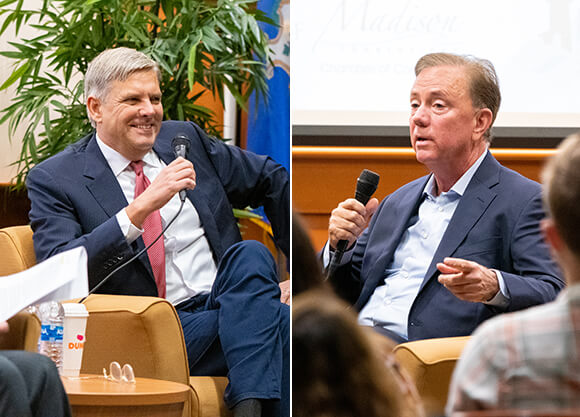
Candidates for governor share their views at North Haven Campus
September 29, 2022

September 29, 2022

The candidates discussed a variety of issues affecting residents, including the business climate, jobs, taxes, affordable housing, transportation and the state’s rainy day fund.
Adam David Roth, dean of the College of Arts and Sciences, welcomed about 100 spectators to the 2022 Gubernatorial Election Forum, including local business leaders, Hamden Mayor Lauren Garrett and North Haven First Selectman Michael Freda.
As part of his remarks, Roth said the forum couldn’t have been held in a more perfect setting. He said Quinnipiac’s eight schools and the College of Arts and Sciences play a key role in educating students for the state’s workforce of tomorrow.
“At Quinnipiac, one of our core pillars is focusing on training students to become civic, public and professional leaders in the 21st century,” Roth said. “We do that through a variety of our academic programs, whether that might be political science or civic leadership.
“Programs like our QU in DC immersion experience train students to become civically engaged while at Quinnipiac and beyond, helping them to understand the importance of engaging in the democratic process of voting and instilling in them a lifelong respect and appreciation for open dialogue and debate.”
Garrett Sheehan, president and CEO of the Greater New Haven Chamber of Commerce, also spoke at the event and thanked other local chambers for helping to bring this event to North Haven.
With Election Day less than six weeks away, Lamont and Stefanowski answered questions in separate Q&A sessions on the stage. Jim Perito, a partner at Halloran Sage, served as the event’s moderator.
Both candidates agreed on the need for more affordable housing in Connecticut, especially for the state’s 20-something demographic.
“These are single people. They need a vibrant downtown. They need a studio apartment,” Lamont said, adding that housing is a top priority. “We’re doing everything we can to get our downtowns vibrant, making sure these are places where young people can afford to live. Or folks my age. Want to downsize? Go into an apartment downtown. Free up that house for somebody else.”
Stefanowski said multi-family housing, including downtown rental properties, are essential for young families, too.
“We need more affordable housing. We need more low-cost housing,” said Stefanowski, who grew up in a three-family home in New Haven. “I don’t know where you draw the line, but we need to create housing for kids starting out, young families starting out. We're going to give them a deduction as well for their property taxes and make it easier to build a family there.”
Lamont and Stefanowski differed on the balance of the state’s rainy day fund. Lamont said the state has about $3.5 billion set aside, while Stefanowski put the number well above that figure.
“I would argue, first of all, there's another $2 billion surplus coming this year, so it's actually closer to $6 billion,” Stefanowski said. “That was money we got from the federal government. That was not monopoly money that just rained down from the sky. These are your federal tax dollars. ... They call it the rainy day fund, but it’s pouring outside.”
Stefanowski favors using the surplus to fund statewide tax relief. He recently unveiled a $2 million tax plan to reduce taxes and continue the moratorium on the state’s gasoline tax.
Lamont, meanwhile, supported the transfer of $3.1 billion from the state’s operating surplus into the rainy day fund earlier this month. The move automatically triggered a $2.8 billion payment to reduce unfunded pension costs.
“That says we’re getting our fiscal house in order and that we keep our commitments, say the [credit rating agencies],” Lamont said. “Instead of lowering our ratings for saying that you're doing a little bit better Connecticut and seeing when it comes to tax cuts, it means it's going to save us almost $500 million a year for the next 25 years.”
The state's transportation network, including the expansion of both Tweed-New Haven Airport and Bradley International Airport, was also discussed at the forum.
“Tweed has actually done a really good job, but one of the things you notice about Tweed is that most of their flights are to get out of Connecticut,” Stefanowski said. “People that have moved down to Florida, they’re spending 181 days in Florida to avoid [taxes in Connecticut]. I’m not criticizing anybody who does it, but that’s the reality.
“We need to advocate that Connecticut has the best universities in the world. We have the perfect spot between New York and Boston,” he added. “We have great entrepreneurial spirit, great beaches, so we need to start getting some flights coming in, not facilitating flights going out.”
Lamont pointed to the growth of each airport and the expanded access to air travel for business, leisure and tourism.
“With Tweed, what was it, one flight every three days or something, and now it has 19 different destinations. I think we’re making some progress there ... but we’re understanding the neighbors' point of view as well,” Lamont said. “And Bradley has more destinations today than ever before. Our location is one of our greatest strategic advantages.”
Quinnipiac Today is your source for what's happening throughout #BobcatNation. Sign up for our weekly email newsletter to be among the first to know about news, events and members of our Bobcat family who are making a positive difference in our world.
Sign Up Now